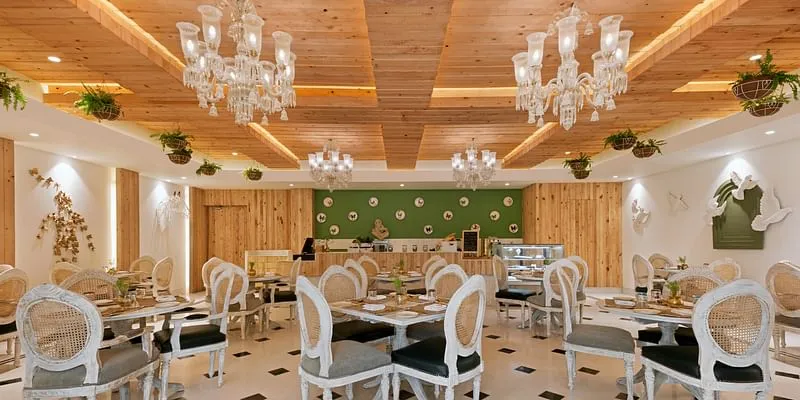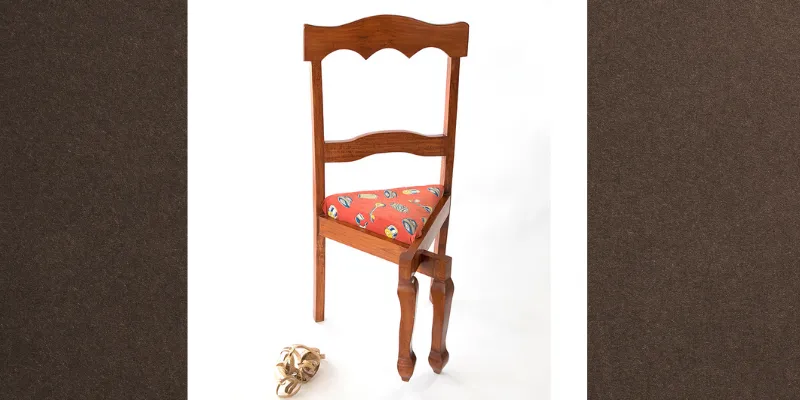Artist to artist: how this interior designer is empowering local artisans in UP
Interior designer Ankita Jaiswal launched her passion project, Lucknow-based Brio Art House and café, to empower local artisans of India.
Brio Art House and Cafe claims to showcase “the way people should be living”, with sustainable furniture and decor and fresh, organic food.
A passion project of interior designer Ankita Jaiswal, the cafe, located near Kanpur Road in Lucknow, embraces traditional dining practices by growing its own vegetables, using tableware like kulhads, and abstaining from using modern technologies like microwave ovens.
“Because that is not how food is supposed to be had,” she says.
“We do not use materials like bone China that involve animal cruelty by use of bone ash. We hope to offer an experience of being in sync with nature by engaging in environment-friendly and sustainable practices,” she adds.

Brio cafe in Lucknow
The art house features unique home decor items that can be bought in person and online through WhatsApp and other social media platforms. These are created by about 15 artisans specialising in traditional arts and crafts like Zardosi, Chikankari with khadi, ceramic, and others.
Ankita says her venture has been less about running a brand or business, and “more about supporting the livelihood of the artisans and keeping their practices alive”.
Art and sustainability
Hailing from a business family, Ankita found solace and peace in art and culture. She developed an interest as a student at St Agnes' Loreto and Avadh Girls’ Degree College in Lucknow, and pursued a six-months course in sculpting from Lalit Kala Akademi, Lucknow.
“Being an artist has been a journey of observing things, people, and expressing through my work. And that is how sustainability became important to me,” she shares.
Although Ankita has always been in touch with a handful of artisans to source her work, assuming the role of chairman for art and craft, UP Hotels in 2016 gave her the opportunity to work with more artisans.
She notes that many Indians appreciate art and travel abroad and visit famous museums, but fail to embrace centuries-old art within their own country. This is why Brio Art House came to life to create more employment opportunities in 2017. The cafe was incorporated later in 2019.

A local artisan in UP modeling a furniture out of waste wood.
The art house offers a wide range of affordable products from seeded pencils, planters, and wall hangings to unique furniture and decor, priced between Rs 70 and Rs 5,000. Working with about 15 artisans at the moment, it sold nearly 80 units per month in early 2020, but sales went down during the second wave of COVID-19.
She says people have been skeptical of buying handmade products, worried about their longevity over commercial and branded products.
The frequent lockdowns and restriction on movement due to COVID-19 were tough for the business, but the artisans continue to be under Ankita’s care.
“Although there has been no sale due to COVID-19, we support the artisans and their family members because there are children who need education and proper food, and they need to celebrate festivals as a family. I can't just let them go."

Cross-legged chair by Ankita Jaiswal
The balancing act

Ankita Jaiswal, Interior designer and founder of Brio Art House and cafe
Although driving business would ultimately help achieve her goal to uplift local artisans, Ankita believes her work should speak for itself and connect with people as an artist.
“The growth of my website is taking time. For a business-oriented person, it is a two-minute job but I want it to grow organically by connecting with people,” she says.
As a perfectionist and self-taught artist, she says it took years of trial and error method to reach where she is as an artist as well as an entrepreneur.
Today, she manages everything from ideating to explaining the message behind each piece to artisans, taking pictures, managing sales on social channels, and dispatching the products with personal handwritten notes that share the stories of artisans who crafted the piece.
As Ankita continues to channel her ideas and emotion through art, she hopes to bring more artisans along with the growth of the art house and cafe “once COVID-19 settles”.
Edited by Teja Lele









